“Ad Astra per Aspera” is more than just a classic courtroom episode: it is arguably the strongest attack Star Trek has made on the social questions and reactionary politics of our time, in a tradition that goes right back to the days when Gene Roddenberry fought with NBC executives over interracial kisses and women in authority positions. It is enjoyable, it is direct, and it is bold. It falls short in some ways with the use of allegory, but it’s message of defiance and hope is unavoidable.
We open with a flashback to Una’s fearful childhood; a slightly dissonant beginning that does highlight the dangers of being an augment in Federation society. In the present, Lt. Commander Una Chin-Riley (Rebecca Romijn) is offered a plea deal by Captain Batel (Melanie Scrofano), who has for reasons best left to the writers been enlisted as the prosecution in Starfleet v. Chin-Riley.
The offer, which would result in a dishonorable discharge for Una, reeks of a grim coverup, and of Starfleet not willing to confront the fact that it let an augment this far into it’s ranks. With only a half-hearted defense lawyer from the JAG office to defend Una, Captain Pike (Anson Mount) has gone to the Voltara Nebula in search of Neera (Yetide Badaki) — an Illyrian lawyer and former friend of Number One — to take the case.
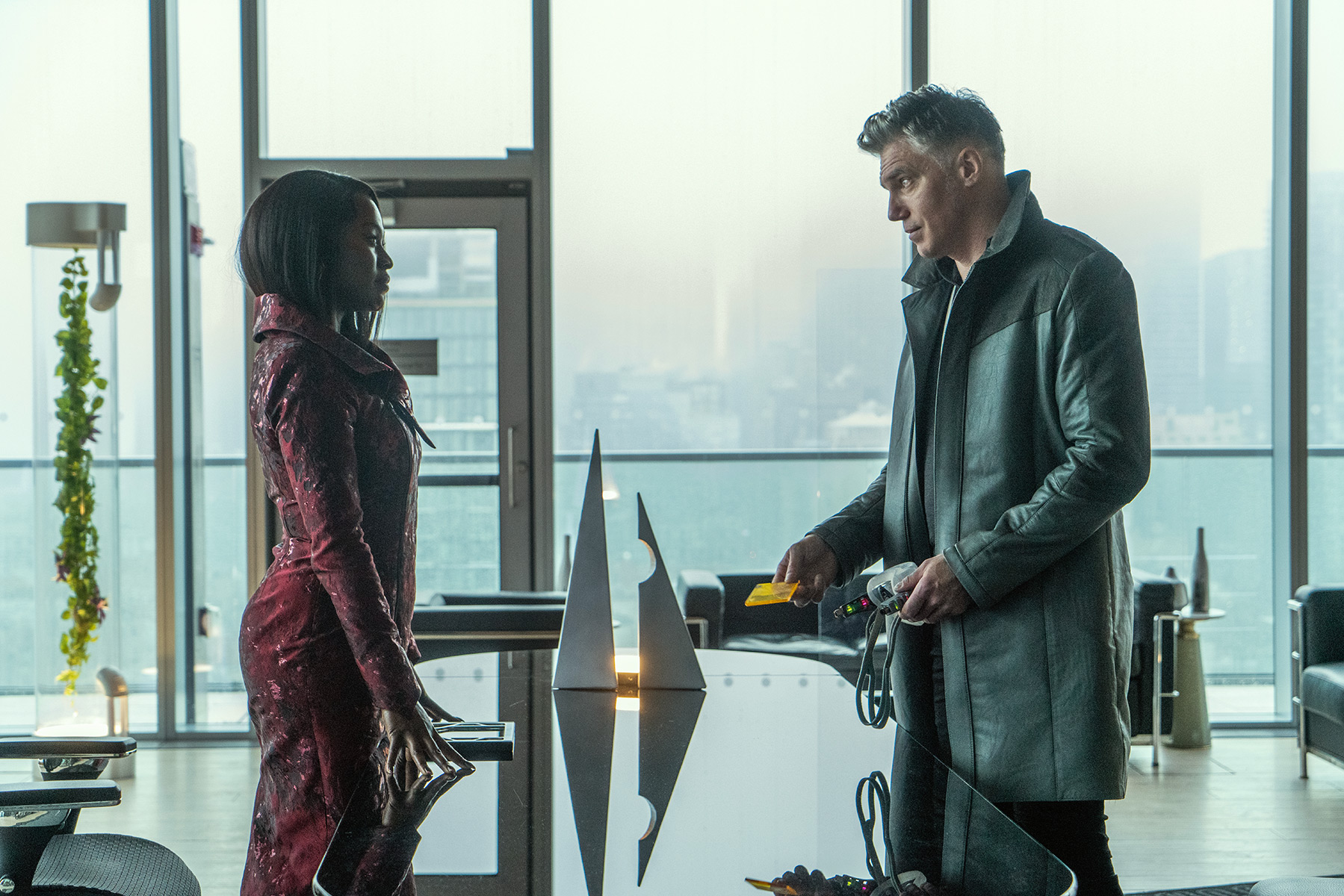
After getting into her office on pain of asphyxiation in the toxic atmosphere of the planet, Pike pleads Una’s case to the deeply disinterested Neera. Her hostility to the UFP and it’s anti-augmentation laws is clear, and even Pike’s admittance of his own faults and disapproval of Federation policy does little to sway her; the draconian race laws of Starfleet would seem to give Una little chance of success. Pike does point out that Neera’s own civil rights struggles against the Federation are hitting dead ends, however: defending Una and winning would give her the platform and profile to make serious inroads against anti-Augment laws.
It’s an opportunity she can’t seem to refuse as she turns up to defend Una, giving her old friend the coldest of cold lawyerly shoulders as she prepares to take up her defense. These sequences, even as the barest table settings, make clear that this is going to be a lot more than a rehash of Next Gen‘s “A Measure of a Man,” and miles away from the (frankly) half-assed civil rights discussions of Voyager‘s “Author, Author.”
There isn’t going to be any view from both sides of the coin: the episode knows what’s right and what’s wrong, and the narrative makes sure you do too.
Neera is defiant and eloquent even here as she attempts to turn down Pike’s plea, and even when she arrives on Earth; her conversation with Una immediately dives into the nuances of marginalization and bitterness between those who can pass and those who cannot. Una doesn’t want to hide anymore; but Neera correctly points out that many others can’t hide, and others — like her — won’t.
Nevertheless, the plea deal is turned down, much to Batel’s fury; her offer cost her a lot to get and now JAG prosecutor Admiral Pasik (Graeme Somerville) is pushing for a harsher sentence: discharge, a sedition charge and 20 years in prison!
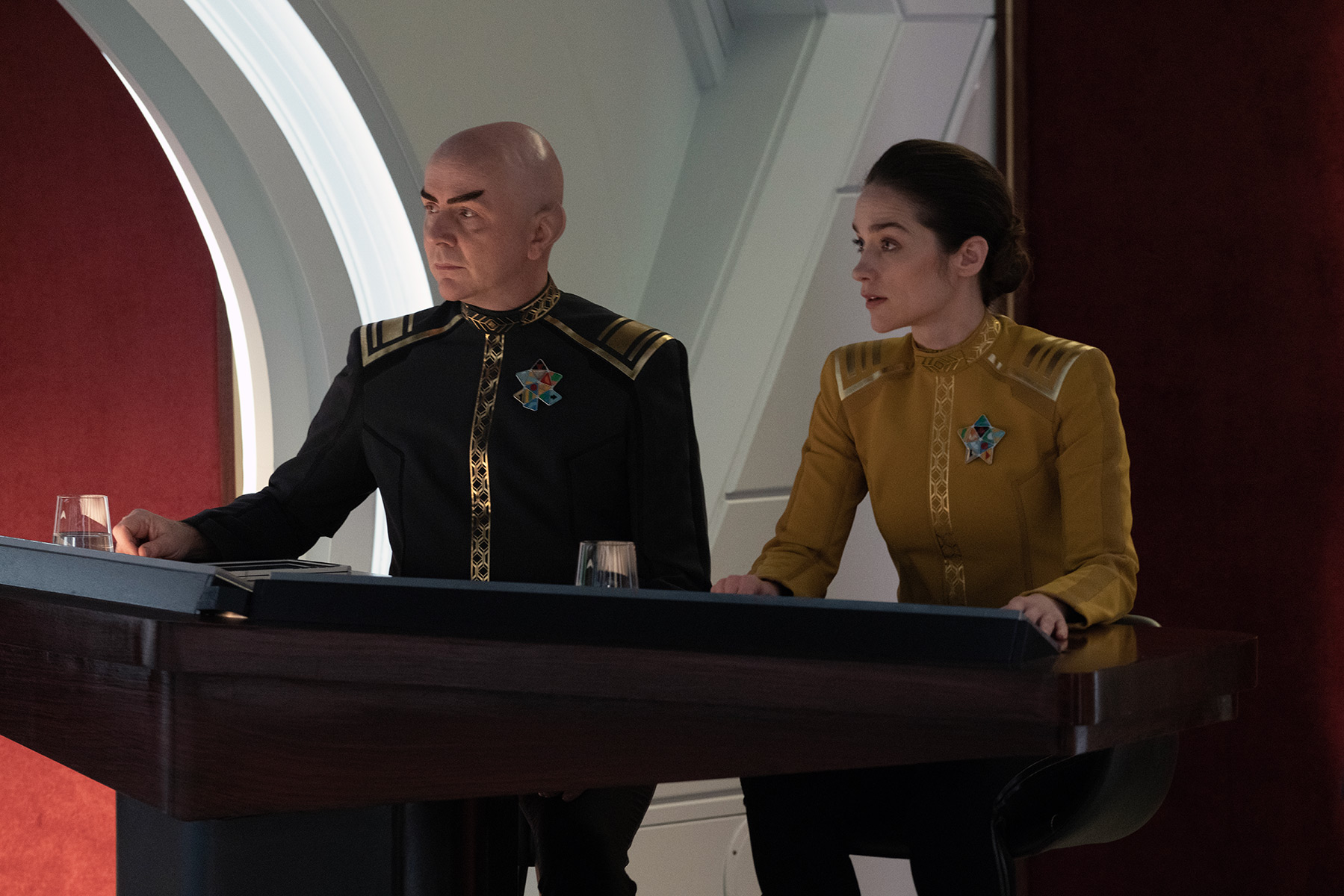
With the stakes set high, both Una and Pike to their best to fight the case from the stand; both are argued down by Neera and Batel respectively on the point that the could jeopardize the careers of the whole Enterprise crew, who arguably have been covering up for Una the whole time. With the senior staff forced to watch from the sidelines, La’an Noonien-Singh (Christina Chong) does her best to find out who turned Number One in, encountering resistance from Uhura (Celia Rose Gooding), who refuses to break regulations and give the security chief the private logs she wants. It’s a small moment, but once again Rose-Gooding and Chong excel in the spotlight, with Uhura’s consummate professionalism never wavering for moment; even if it hurts her to do so.
The trial sequences are dripping in the aesthetic retro-60s charm that we’ve grown to love from Strange New Worlds. The visuals of the golden bell, the ornate and masterful dress uniforms with clustered medals, and verifier scanner on the witness chair are all brilliant homages to the Original Series episode “Court Martial,” the genesis of the Star Trek courtroom episode. The case of immovable law against passionate counter-case also rings tonally of Kirk vs. the computer, but here the similarities end.
Neera goes directly for the intention of the law, reminding the judges (and viewers at home) that laws do not make justice on their own, and that civil rights history is a long struggle of moral right against legal might. The questioning and cross-examination of Admiral April (Adrian Holmes) is a masterful attack by Neera on Starfleet’s own well-discussed double standards on legal enforcements, with April’s repeated violations of General Order One contrasted with his reassessment of sponsoring Una’s Starfleet application.
It’s a heated scene, well-acted by Holmes and Badaki as April’s career is put in the spotlight, much to his irritation. Una is angry at Neera’s stunt too, even as her lawyer points out the privileged position, they both must make a stand for all Illyrians here. Is it just a soapbox to Neera? Possibly. It’s an interesting and difficult question, made even more pointed by the question of whether or not Una is leaving the rest of her people behind by making the case just about herself.
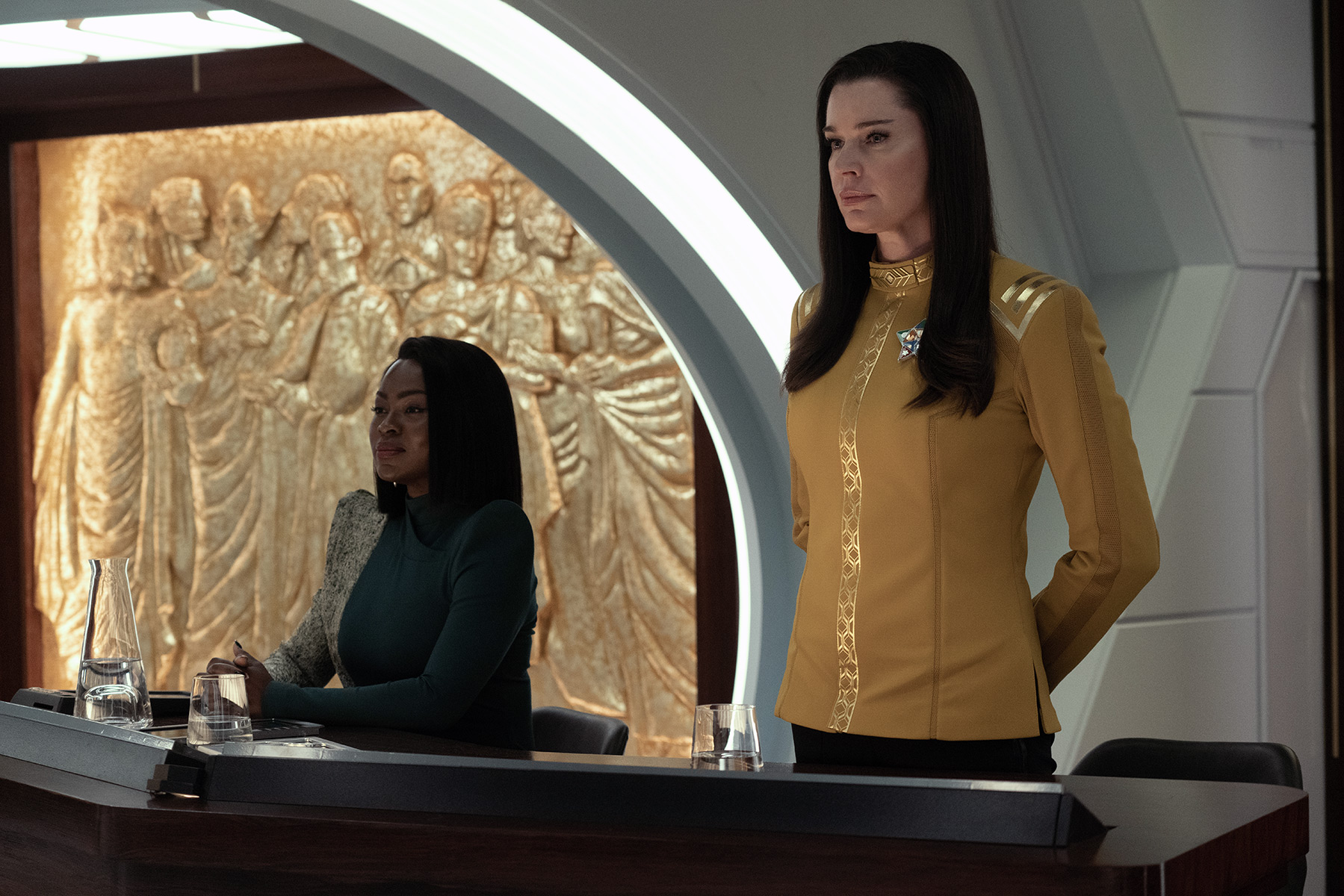
The character witness sequences with La’an, Spock (Ethan Peck) and M’Benga (Babs Olosanmokun) are a further delight, and not just because of their dress uniforms. All three offer unique defenses of Number One, with La’an’s mentor relationship a special highlight. Una — who saved her from the Gorn and encouraged her to join Starfleet and do good — is family. We even get a classic “Spock counters your logic with better logic” moment, when he argues that convicting Una would be a net loss to Starfleet: a naturally illogical action.
Once again, Strange New Worlds takes advantage of and uses it’s long-term serialisation for good here: we’ve seen how exactly La’an felt about the revelation in the first moment, but that the full-throated defence and belief in Una now feels like a graceful and well-earned full circle moment. The subsequent scene where Neera confronts Noonien-Singh about her own suspicion — that her own heated private log condemned Una — does mix the metaphors a little, allegory wise, but it still delivers the crucial message around not being ashamed of who you are, and who you are is defined only by who you are.
Una’s deposition is the cornerstone of the episode, and a stellar performance by Romjin and Badaki. It pulls no punches in its descriptions of Una’s childhood as part of a Federation colony in the Voltara Nebula, where the Illyrian community she was a part of was marginalized and oppressed by Federation law and society; their customs eroded, the families arrested and harassed and community divided. The description of her own brush with death, caused by the fear of exposure by an unsympathetic doctor, was tied with flashbacks throughout the episode, The breakup of her community and the pain that caused is clear; the ghettoization of the Illyrian community splitting families and friendships apart.
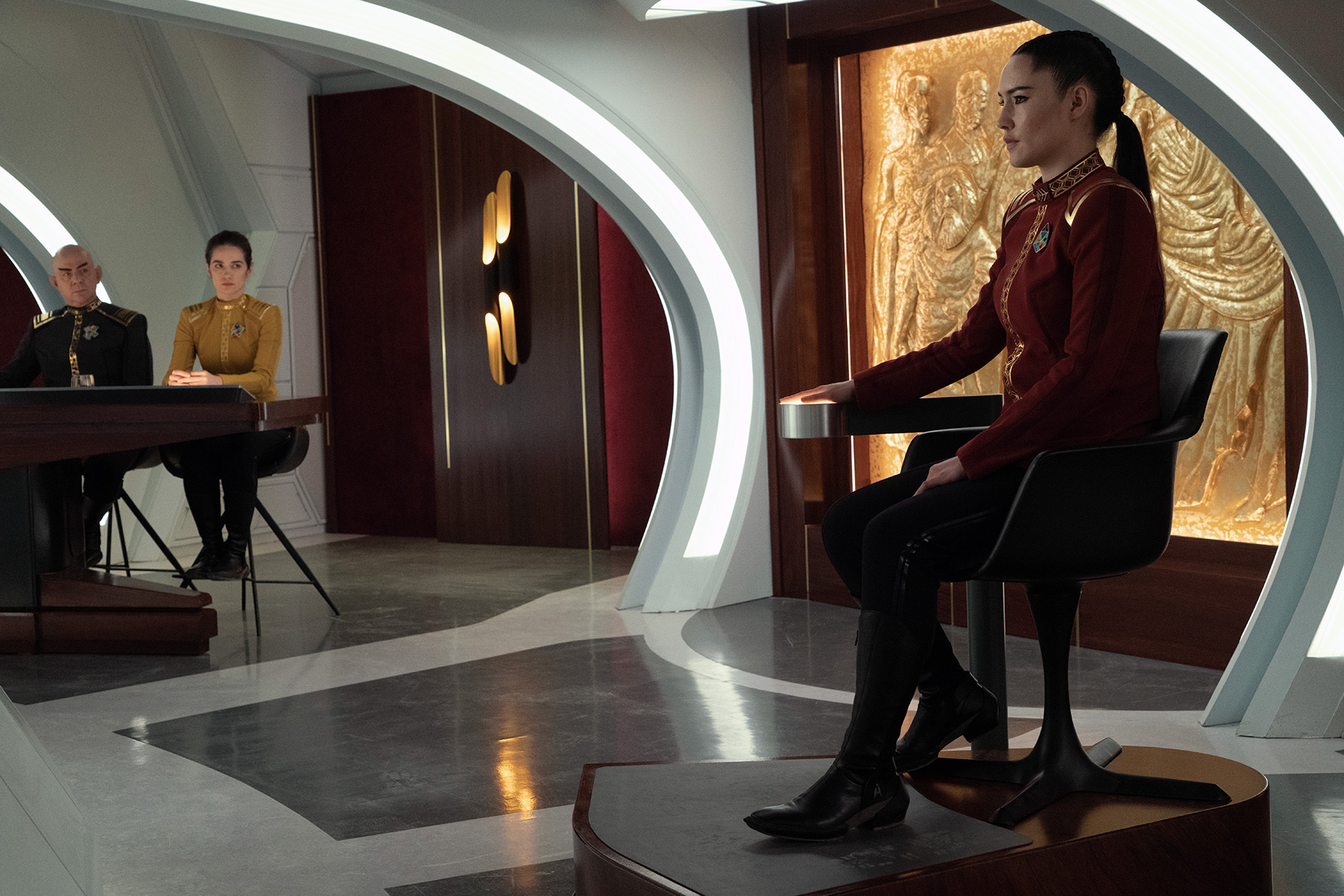
The fact that Una’s family escaped the tyranny of “separate but equal” is not lost on us or the characters, and her open admission that her family had the privilege to “pass” as unmodified — alongside her apology to Neera — speaks to a distinct understanding from the writer’s room of how difficult a choice passing has been for marginalized communities, where it is racial, religious, sexual or gender based persecution that they are trying to escape.
The killer blow of the sequence is the revelation that Una turned herself in. She was tired of living a lie and pretending to be someone else; of hiding her heritage. It was more important to her that her friends knew who she really was. She believed the Starfleet would accept her, despite the obvious ramifications; and that the organizations constant striving to be better than itself would see her through. “Ad Astra per Aspera,” indeed. It is a mission statement about what Starfleet (and the franchise itself) is all about: delivering ourselves from hardship to the stars, and the belief in a better world to come, and of the possibility of our salvation.
Admiral Pasik is, unimpressed, however. The law is the law, and the facts imply that Pike has been involved in a grand conspiracy to cover up a crime, as he knew about Una’s heritage for a long time beforehand. However, Neera uses this fact to present a new and unique counter-case. Citing Starfleet Code 8514, she argues that the three principles of asylum-seeking law in the Federation — clear persecution, seeking safety within Starfleet care and revealing themselves to an authority — have been met. Furthermore, that Pike’s acceptance and the current tribunal both vindicate the legal grounds necessary to vindicate and legalize Una’s position within Starfleet.
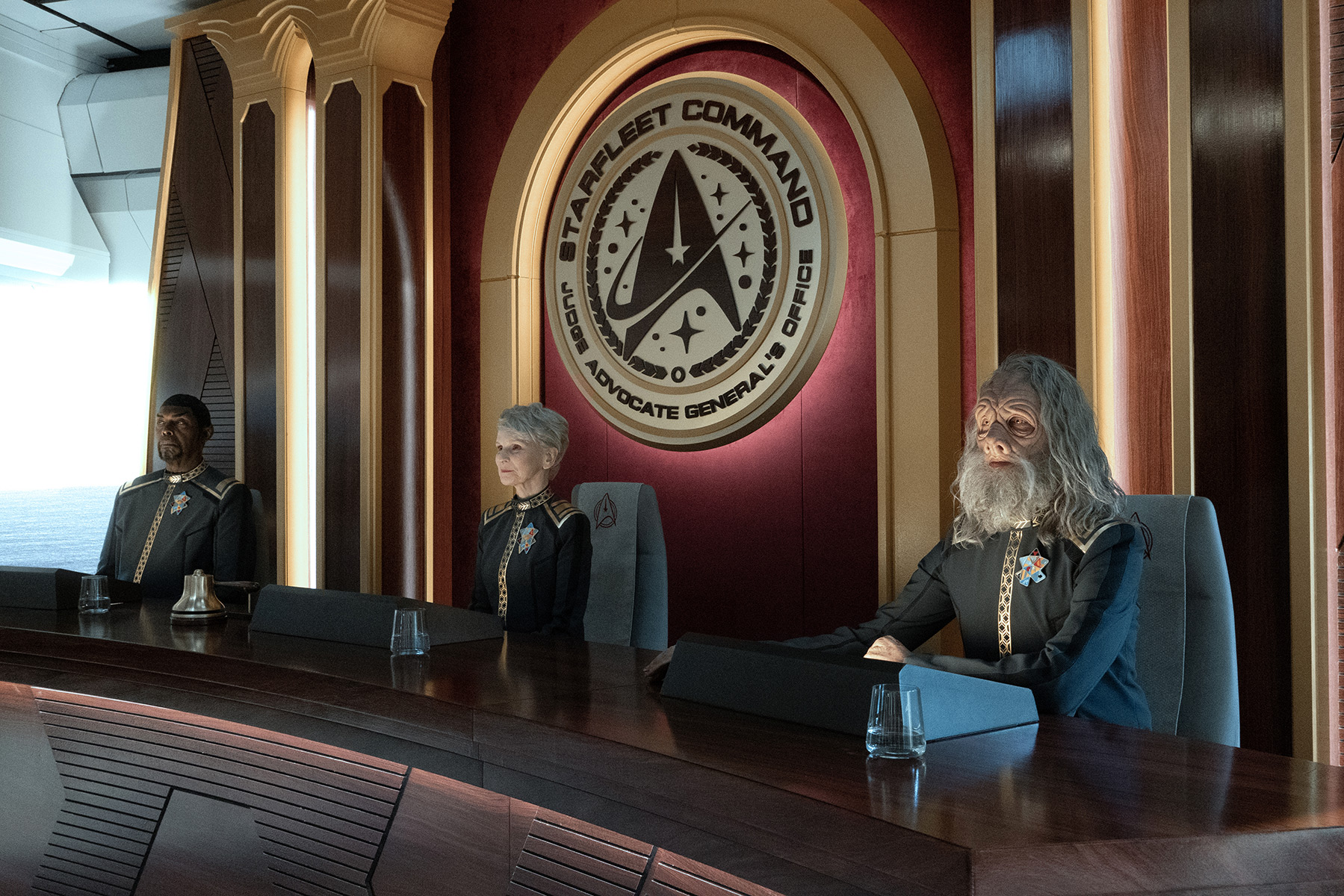
The judgement call of a Starfleet captain — the loophole that Neera used to attack April — comes back to save the day, as she appeals to the judges to “be their better selves” and understand the idealism of the law. Which of course they do, but not without the acknowledgement that despite the questioning nature of the law, there are clear individual cases to be considered. Therefore, Una will be granted asylum alongside a not guilty charge. Like almost all real work legal cases, it is an unhappy compromise.
But Una returns to the Enterprise to the joy of everyone involved, as Neera acknowledges that the case — and the proud crew — might not be the game changer for Illyrian rights… but at least it’s a step in the right direction.
CAMP NONSENSE OF THE WEEK
This week’s camp nonsense goes to the heated (by Vulcan standards) conversation between Spock and Vice Admiral Pasik, as M’Benga and Ortegas (Melissa Navia) observe from afar. It’s always about the subtlety with Vulcans, isn’t it?
OBSERVATION LOUNGE
- The updated dress uniforms include rank tabs on the shoulders and a redesign of the triangular medal clusters introduced in the Original Series dress uniforms, but they retain the fabulous golden piping. It also confirms that the grey-black uniform April wears is a staff officer’s uniform, used by Admiralty personnel.
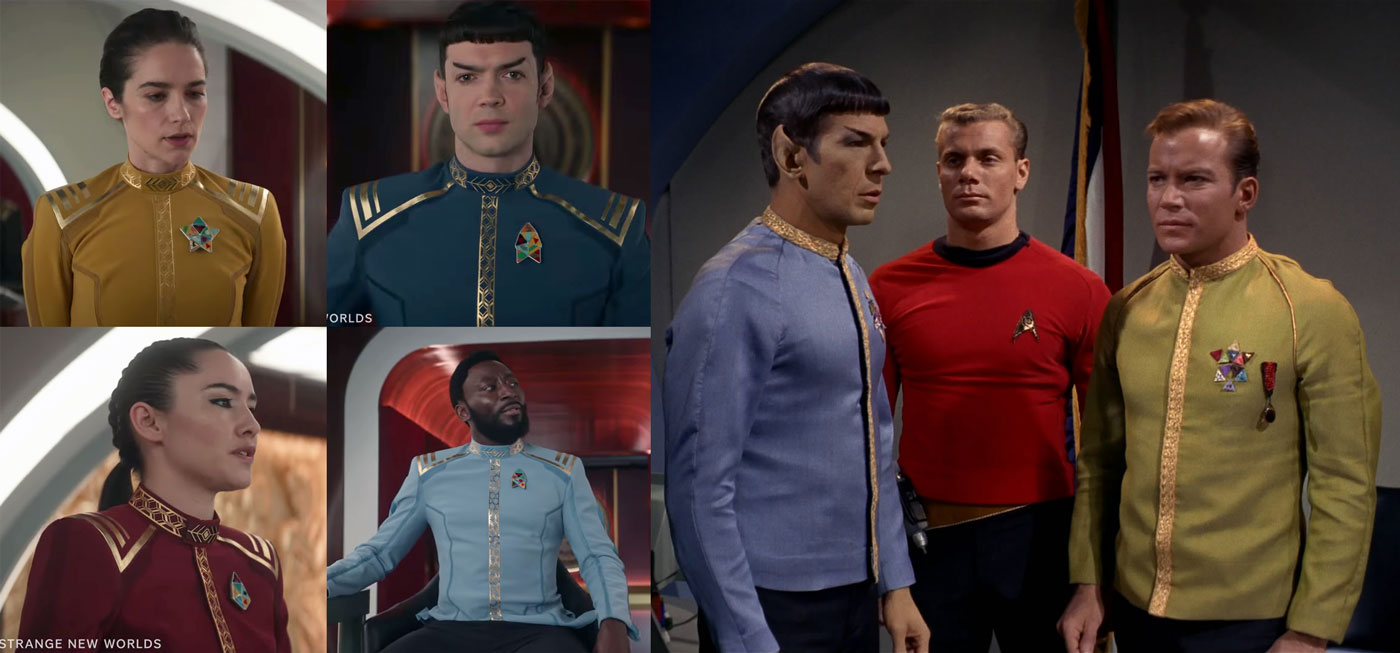
- We see the return of a “Space Command Representative”, even if we still have no idea what that means. As Memory Alpha describes the early days of TOS jargon, “the terms “Star Service” and “Spacefleet Command” were later used in “The Conscience of the King” and “The Squire of Gothos” respectively, prior to the initial airing of “Court Martial.” Another early variant of the organization’s name was “Space Central” in “Miri.”
- Neera is presented with, and then uses as a prop in the courtroom, a physical copy of the Starfleet Uniform Code: something the great Samuel T. Cogley would be proud of!
- The courtroom itself is a redress of the Federation Headquarters set from Star Trek: Discovery.
- This episode gives us the first showing of San Francisco, home of Starfleet Command, in Strange New Worlds; one establishing shot even shares similarities with the establishing shot from Star Trek: The Motion Picture. (We last saw the city during this era in the Season 2 finale of Discovery, “Such Sweet Sorrow, Part 2.”)
- Captain Batel’s service as the prosecution lawyer mirrors the assignments of Picard, Sisko and others as advocates — hough why the captain of an active Starship is needed to perform this duty at Starfleet Headquarters, home to presumably several dozen other Starfleet lawyers is beyond me.
- Una joined Starfleet 25 years ago, which would date her entry into the academy to 2235. The fact that Pike addressed her Academy class would meet they met in the late 2230s/early 2240s — which fits with Discovery’s presentation of Pike joining Starfleet in the mid-2220s. (This doesn’t quite cover explain how he’d still be a lieutenant in the late 2240s, but we’ll save the question of Pike’s career stagnation for another time).
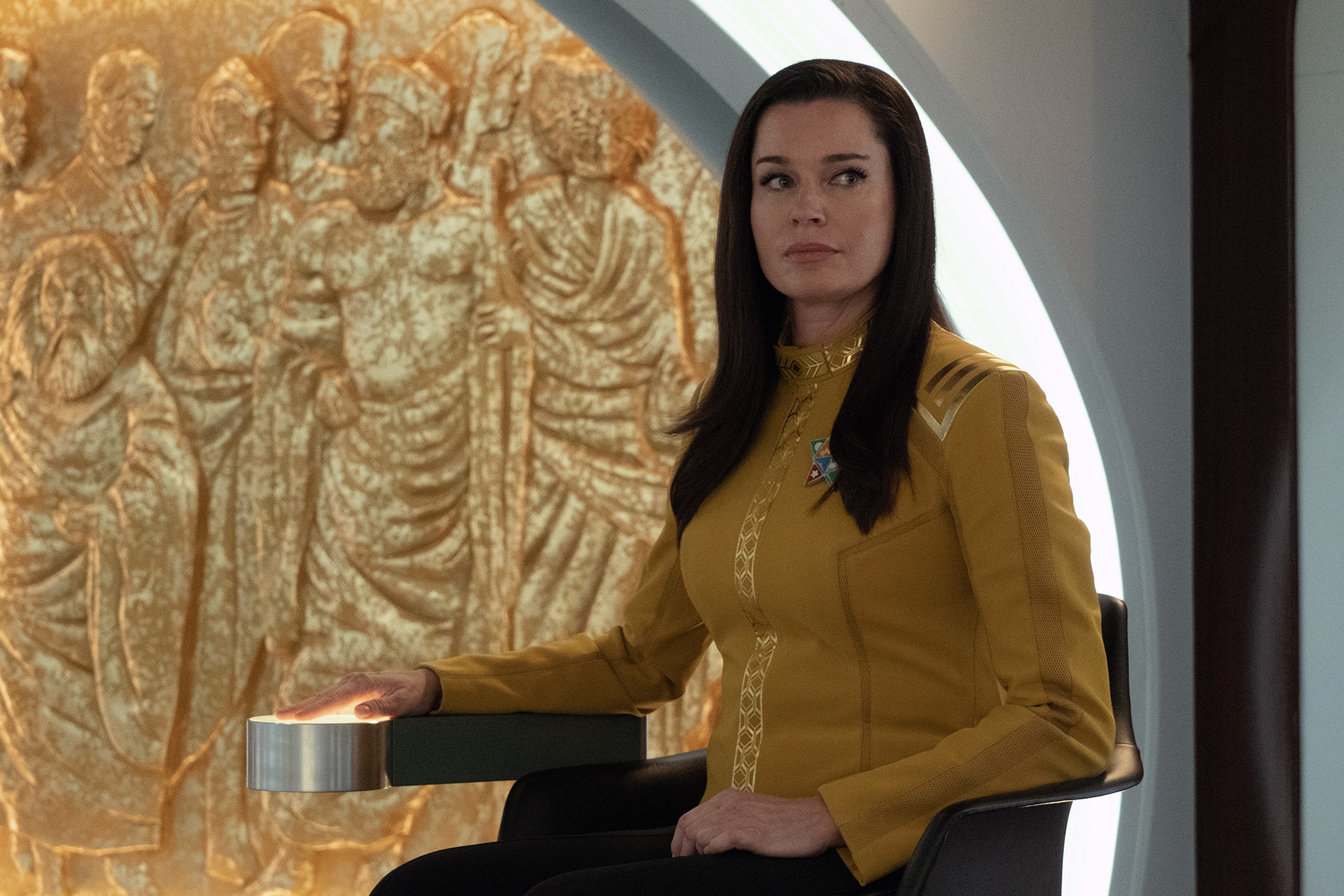
“Ad Astra per Aspera” is a well written, well-acted and deeply enjoyable episode that unavoidably speaks to the critical issues of our time. I’m sure plenty of people on social media, and perhaps in the comment section below, are going to blithely pretend this episode was about something other than LGBT rights. (Sure, and maybe “Let That Be Your Last Battlefield” was about the plight of French Huguenots.)
The llyrian allegory may be an allegory, but all know what this is about. This is about the frightening pace of social conservatism, and the increasingly dangerous world in which queer people — and especially trans people — live in.
The descriptions of Una’s childhood persecution — slurs daubed on doors, restaurants turning people away, playground insults, exclusion from medical care and the dissolution of communities as people seek safety from oppression are not distant possibilities — these are the real and lived lives of trans people of all ages across the world. The questions of hiding your identity in your workplace, of hiding your true self from your friends and loved ones: these aren’t arbitrary concepts: it is the terrifying reality for millions across the globe.
The flashback of young Una’s parents worrying about whether the wrong doctor will turn them and their child over to the state isn’t fiction for many families across the United States; it is now a terrifying reality we cannot afford to ignore.
Making a point about wrong that is, and how we should be better than that is exactly what Star Trek should be doing every single time it comes on screen, and I challenge anyone to tell me how confronting bigotry would go against the original mission statement of this franchise. Strange New Worlds releasing this episode in the middle of a pride month that — on both sides of the Atlantic — has been scarred by an increase in social and political bigotry aimed at LGBT communities is not an accident. It is not intended to make you consider what your position is, or to show you “both sides” of the coin. It is a call to arms, and reminder that Trek is about that struggle through adversity to the stars.
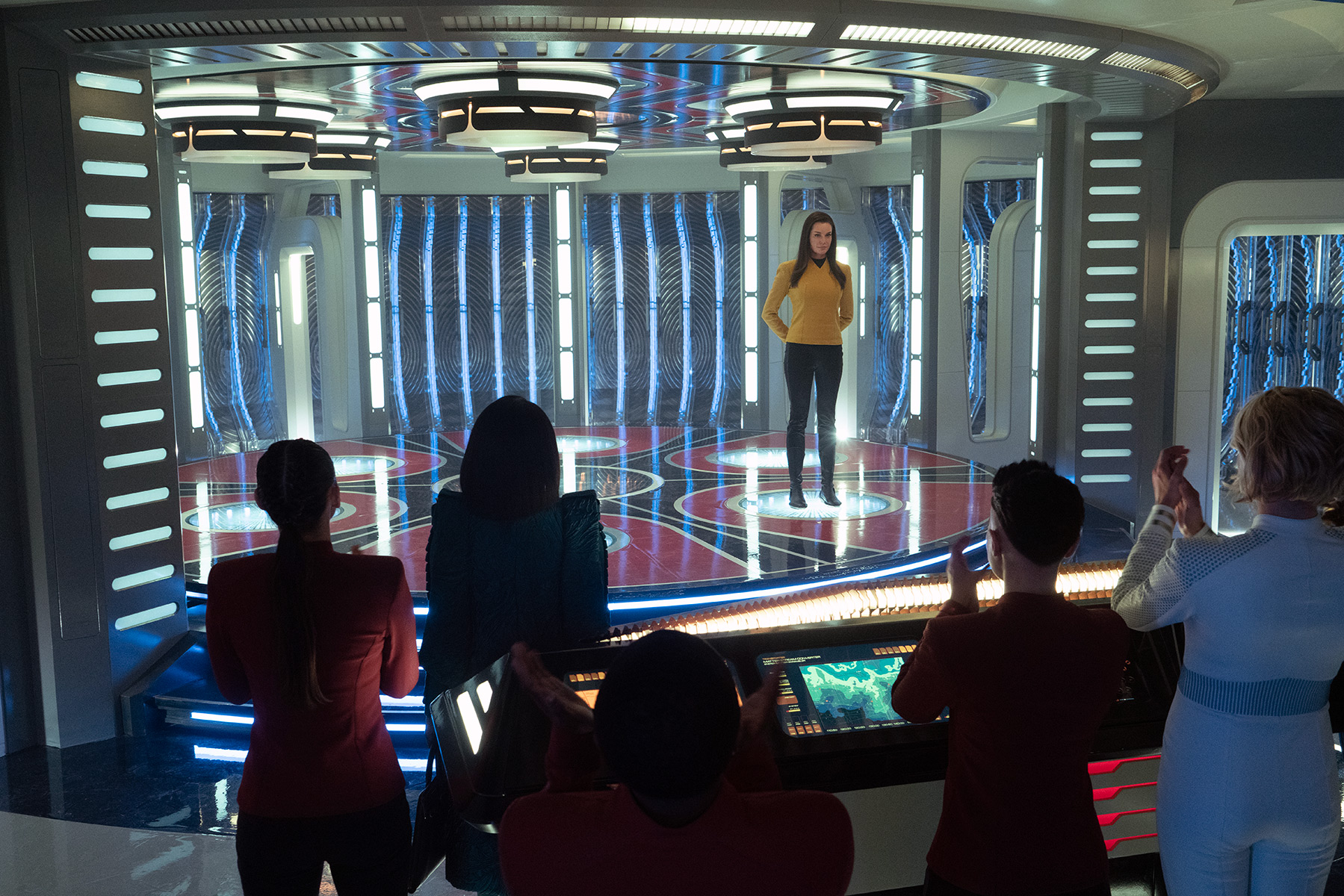
It is not a perfect story. There was an opportunity to put overtly queer relationships or characters on screen, and that choice wasn’t taken. Adding that element into the dynamics would have sealed this episode for me, and that omission does begin to tell the more I think about it. The confused nature of the Augment allegory — portrayed as villainous despots in “Space Seed” and the three-episode Star Trek: Enterprise Augment arc, while analogous for marginalised communities in Strange New Worlds (and, arguably, with Julian Bashir in Deep Space Nine) — doesn’t help either.
I can see how re-interpreting them as an allegory for queerness works, but at the end of the day, it’s not really a substitute for proper representation — which still remains lacking in the Trek franchise outside of Star Trek: Discovery. With that show coming to a close early next year, the franchise will be carried by Strange New Worlds, as will the mantle of full-throated representation the show is noticeably avoiding.
This doesn’t mean I think this is a bad episode, of course; I just think that these decisions kept a great episode from becoming a stand-out one. I am sure in a year, or five years, or maybe in fifty, we will view this episode with the side-eye which which we view the Original Series’ ham-fisted allegories. But when we look back with derision, it will be because we have become our better selves, despite all that is in our way — but for now, at least it’s a start.
* * *
In case you missed it, Paramount+ has also released a new trailer showcasing some of the additional upcoming adventures this season — including a seemingly human Spock, the return of Lieutenant James T. Kirk (Paul Wesley), and Star Trek: Lower Decks’ Brad Boimler (Jack Quaid) aboard the Enterprise.
![]()
Star Trek: Strange New Worlds returns with “Tomorrow and Tomorrow and Tomorrow” on Thursday, June 29 on Paramount+ in the U.S, the U.K., Australia, Latin America, Brazil, France, Italy, Germany, Switzerland and Austria.
